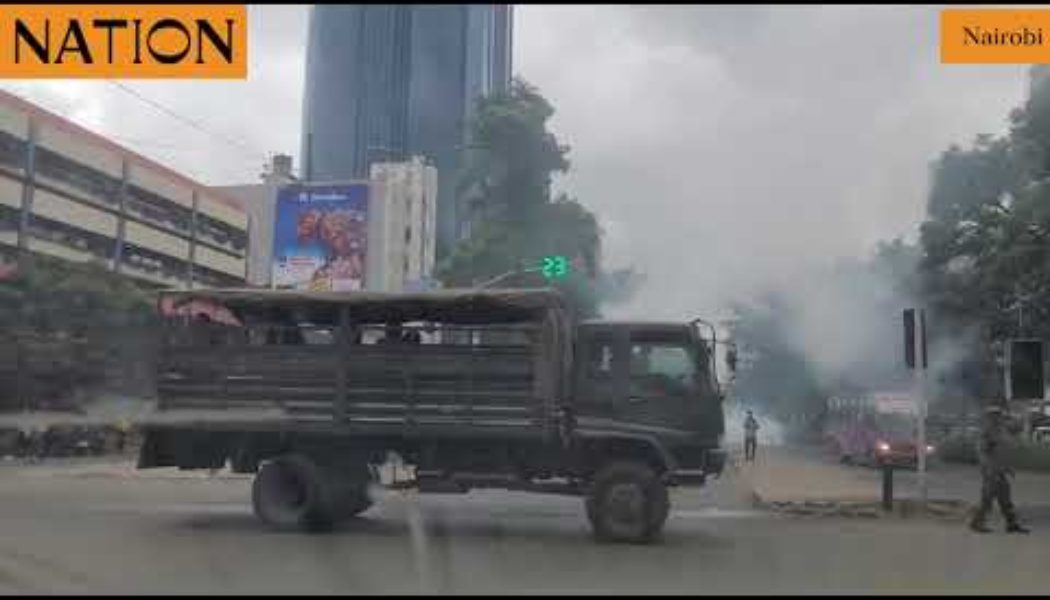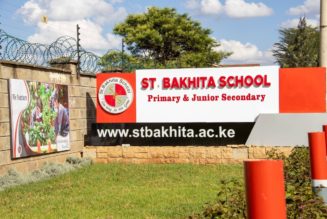Anti-Finance Bill protests in Kenya have spread from the capital Nairobi to various parts of the country, as taxpayers continue to oppose President William Ruto’s plan to finance his Sh3.9 trillion Budget.
On Thursday morning, street demos returned to the streets of Nairobi after a 24-hour break, with armed police firing teargas to disperse protesters.
The officers engaged crowds of mostly youthful demonstrators, who were attempting to access Parliament Buildings, in running battles.
Anti-riot police blocked several roads near Parliament to man it and ensure no civilians access it.
“We shall use other ways to get to Parliament and occupy it,” a protester said.
Similar demos were witnessed in other cities and towns— including Kisumu, Lodwar, Kakamega, Kisii, Nakuru, Eldoret, Nyeri, Meru, Nanyuki, Mombasa and Kilifi at the Coast.
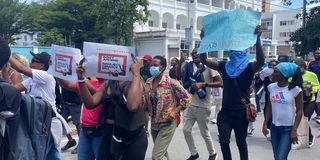
Mombasa residents take part in a peaceful march to protest against Finance Bill 2024.
Photo credit: Jurgen Nambeka | Nation Media Group
The protesters, who forced Dr Ruto to climb down on some of his tax measures, now want the entire bill shot down by the members of Parliament.
“Don’t Amend, Reject! Ruto Must Go!,” they chanted as they engaged police in cat-and-mouse games in Nairobi’s Central Business District.
In Dr Ruto’s hometown of Eldoret, thousands of youthful protesters poured on the streets, bringing business in the town to a standstill.
The large crowds that took part in #OccupyEldoret demos mimicked the sea of humanity that was witnessed during celebration of President Ruto’s 2022 election win, and when he was sworn into office.
The demonstrators caused excitement in the town, with onlookers expressing support for their push to have the Kenya Kwanza administration drop punitive taxes in Finance Bill 2024.
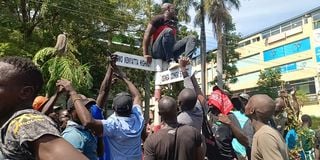
Some protestors in Kisumu asking a certain “Zakayo” to climb down.
Photo credit: Rushdie Oudia | Nation Media Group
As witnessed in Nairobi and other cities, the majority of the protestors in Eldoret were the Generation Zs, with a few millennials joining them in the demos that appeared to be very organised.
Waving protest placards and chanting anti-Finance Bill, anti-Ruto, anti-government tunes, the protesters had initially organised themselves into about four groups of several hundred before converging at different spots on the outskirts of the town.
The messages were strong: Ruto Must Go! Occupy Eldoret! Reject Finance Bill!
The protesters called out their elected leaders as they warned that they would keenly watch MPs as they vote on the bill on Thursday afternoon.
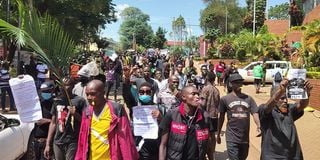
Anti-Finance Bill protests along the streets of Kisii town on June 20, 2024.
Photo credit: Ruth Mbula | Nation Media Group
The demos were mostly peaceful, with no single case of tear gas canisters being lobbed as police walked alongside the protesters.
While there was a heavy presence of police, the law enforcement officers were peacefully guiding and protecting the demonstrators.
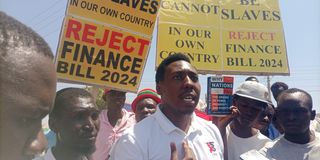
Mr Shadrack Muyesu, an Advocate of the High Court, leads anti-Finance bill protests in Lodwar town in Turkana County.
Photo credit: Sammy Lutta | Nation Media Group
In Kilifi County, thousands of youths poured into the streets to add their voices against the Finance Bill 2024.
While chanting slogans against the bill and the Kenya Kwanza regime at large, the protesters crisscrossed the streets of Kilif, bringing business to a standstill.
Although the protests earlier started with students, mainly from Pwani University, the crowd grew as it marched along the streets, joined by some of the residents and boda boda riders.
The protesters, dressed in black outfits, walked from Pwani University to the town market, along Kilifi bridge and back to the town, where they made stopovers driving their point home.

A protester reacts during the protests in Nakuru City.
Photo credit: Boniface Mwangi | Nation Media Group
For a moment, they also blocked access to the Kilifi Huduma Centre and later on headed to the governor’s office.
In Voi, Taita Taveta County, the protests against the Finance Bill that had been planned by various groups failed to gain the momentum as expected.
Despite a group of youths showing up to demonstrate, the protests were short-lived as the crowd failed to draw more protesters.
However, law enforcement officers were seen conducting patrols in Voi town to deter any potential acts of lawlessness.
In Mombasa, protesters who had participated in the Wednesday’s gathering marched on Moi Avenue to oppose the bill.
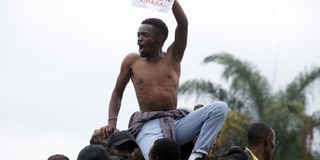
Youth stage peaceful demonstrations against the Finance Bill in Nyeri town on June 20, 2024.
Photo credit: Joseph Kanyi | Nation Media Group
In Kisumu, protests turned ugly after a section of the demonstrators engaged police in running battles.
The law enforcers were forced fire tear gas canisters at demonstrators to disperse them.
The protests started early in the morning at the famous Kondele Roundabout, with hundreds of residents, donning black outfits and waving placards, converging there.
The protesters later marched to the central business district via Kenyatta Avenue where they disrupted traffic.
They passed through Kibuye market, the main Kisumu Bus Park, Ang’awa Street before finding their way into the CBD through Oginga Odinga Street.
Some businesses were quickly closed down when the demonstrators, in the hundreds, poured into the CBD.
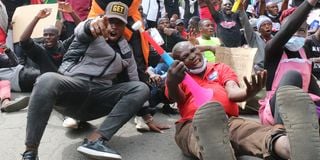
Youth hold peaceful protests along Kenyatta Avenue in Nakuru town.
Photo credit: Boniface Mwangi | Nation Media Group
Earlier, City Manager Abala Wanga had warned the police against the use of excessive force, and the protestors against destruction of property and vandalism.
“It is imperative that the security personnel exercise restraint and avoid the use of excessive force against peaceful demonstrators. Their primary role should be to prevent any unlawful activities, such as vandalism or disruption of businesses,” said Mr Wanga.
According to Mr Obungu Owich, who was among those leading the protest in Kisumu, the residents decided to join the rest of the country in making their voices heard.
“We are asking the president to consider the plight of Kenyans and reduce the high cost of living. We reject the proposed Finance Bill in totality,” said Mr Owich.
In Nakuru, hundreds of residents took to the streets to protest against the Finance Bill, 2024, and the high cost of living.
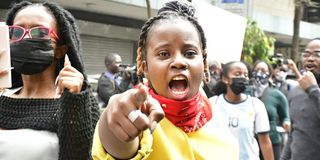
Youths protest along Kimathi Street.
Photo credit: Francis Nderitu | Nation Media Group
The protesters want MPs to reject the bill during the Thursday session.
In Embu, scores of residents accused the government of oppressing Kenyans.
Tension ran high as the demonstrators loudly shouted in protest, demanding that President William Ruto pack up and go home.
“Ruto must go! Ruto must go!” they shouted as they paralysed transport in the usually busy town.
The protesters accused the government of overburdening Kenyans with more taxes despite the prevailing high cost of living.
” This government does not care about us, these taxes are punitive and we shall not accept them,” one of the protesters said.
They vowed to continue protesting until their demands are met.
Reports by Caroline Wafula, Loise Wangui, Eric Matara, Mercy Koskei, Harry Misiko, Wachira Mwangi, Lucy Mkanyika, Rushdie Oudia, Hilary Kimuyu, Jurgen Nambeka, Valentine Obara, George Munene and Evans Jaola.
